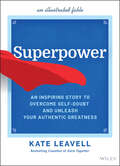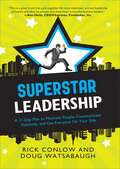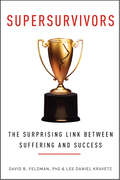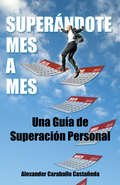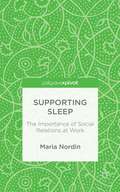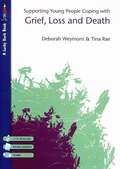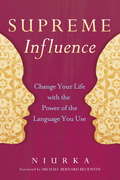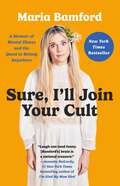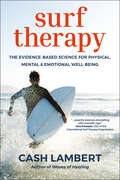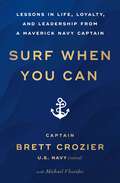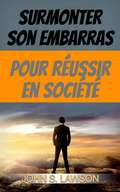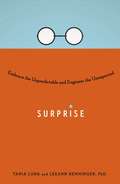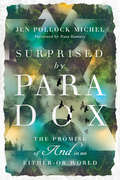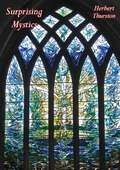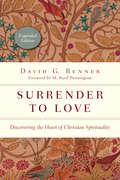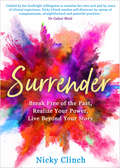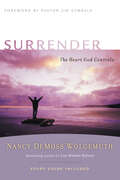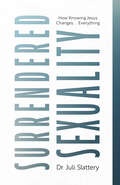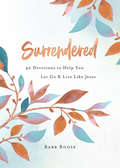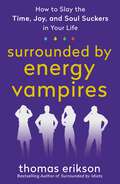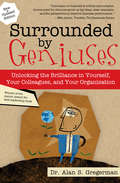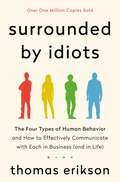- Table View
- List View
Superpower: An Inspiring Story to Overcome Self-Doubt and Unleash Your Authentic Greatness
by Kate LeavellLearn to find your own superpowers with this inspiring journey of self-acceptance In Superpower, bestselling author Kate Leavell delivers a compelling story of self-love, appreciation, and the power of sharing and connecting with those around us through vulnerability and understanding. In the book, a soccer coach tells his players about the adventures of &“the new kid&” at school who&’s afraid of being teased and bullied. Through the help of a special teacher, he and his classmates learn to overcome challenges and harness the power of seeking to understand new perspectives and viewpoints. The class experiences the power of connection inside the activities during puzzle week, and along with their new student, finds the confidence to embrace their unique traits and appreciate and celebrate the uniqueness in each other. In Superpower, you&’ll find: Games to help you discover common interests and get to know those around you on a deeper level Exercises to learn about what it means to have different perspectives and learn from the stories of others Discussion questions for deeper reflection and for group book studies An eye-opening and thought-provoking journey through difference, self-acceptance, and understanding, Superpower shows us how to impact the world for good using our very own, built-in superpowers.
Superstar Leadership: A 31-Day Plan to Motivate People, Communicate Positively, and Get Everyone On Your Side (Superstar: A 31 Day Plan)
by Rick Conlow Doug WatsabaughDiscover and implement “the most important, proven leadership principles and ideas” in just thirty-one days with this step-by-step manual (Ken Hicks, CEO/Chairman, Footlocker, Inc.).It is the rare excellent boss who can achieve great results by earning their staff’s loyalty and inspiring exemplary performance. Now you can learn the secrets of these Superstar leaders—and become one of them. Superstar Leadership examines the key habits of the best and worst bosses, identifying nine key performance drivers that are proven to increase and sustain results. Do you want to earn more money for your company? Electrify your department? Increase customer loyalty, sales, and productivity while simultaneously decreasing turnover, improving innovation, and having fun? With evaluations and activities designed to help you hones your leadership skills, you can achieve all of this.Superstar Leadership will teach you:Why fifty percent of managers fail, and how to avoid being one of themSeven keys to employee motivationThe high-performance formula that will catapult your career successThe nine strategies of a Superstar leaderHow to create a high-performing team and exceed your goalsAnd much more!
Supersurvivors: The Surprising Link Between Suffering and Success
by David B. Feldman Lee Daniel KravetzStarting where resiliency studies leave off, two psychologists explore the science of remarkable accomplishment in the wake of trauma, revealing the surprising principles that allow people to transform their lives and achieve extraordinary things.Over four billion people worldwide will survive a trauma during their lives. Some will experience severe post-traumatic stress. Most will eventually recover and return to life as normal. But sometimes, survivors do more than bounce back. Sometimes they bounce forward.These are the Supersurvivors—individuals who not only rebuild their lives, but also thrive and grow in ways never previously imagined. Beginning where resilience ends, David B. Feldman and Lee Daniel Kravetz look beyond the tenets of traditional psychology for a deeper understanding of the strength of the human spirit. What they have found flies in the face of conventional wisdom—that positive thinking may hinder more than help; that perceived support can be just as good as the real thing; and that realistic expectations may be a key to great success.They introduce the humble but powerful notion of grounded hope as the foundation for overcoming trauma. The authors interviewed dozens of men and women whose stories serve as the counterpoint to the latest scientific research. Feldman and Kravetz then brilliantly weave these extraordinary narratives with new science, creating an emotionally compelling and thought-provoking look at what is possible in the face of human tragedy. Supersurvivors will reset our thinking about how we deal with challenges, no matter how big or small.
Superándote mes a mes: Una Guía de superación personal
by Alexander Caraballo Castañeda¿Buscas convertirte en la Fuente del éxito y de la felicidad para tu vida? <P><P>Aquí encontrarás un conocimiento de superación solo accesible al 1% de la población. En Superándote mes a mes, Alexander reúne y organiza con facilidad elementos cargados de espiritualidad, ciencia y fuerza milenaria. <P><P>Desvela desde una visión holística la energía presente en cada uno de los meses del año, su influencia sobre nuestra vida y las técnicas para trabajarla y conseguir alcanzar el control de nuestro propio destino. <P><P>Marzo es el mes para trabajar en la libertad, abril en la sanación, mayo en el progreso, junio en la visión correcta, julio en el liderazgo, agosto en la acción, septiembre en la rectificación y el equilibrio, octubre en despertar el potencial interior, noviembre en la manifestación de milagros, diciembre en la bendición y la abundancia, enero en la correcta alimentación y febrero en la alegría de vivir. <P><P>Superándote mes a mes, es una guía de crecimiento personal, que te propone y enseña en profundidad, y al mismo tiempo con sencillez, un auténtico camino de superación para lograr que tu vida sea más exitosa, satisfactoria y feliz.
Supporting Young People Coping with Grief, Loss and Death (Lucky Duck Books)
by Tina Rae Deborah WeymontThis book provides students aged 11 to 18 the opportunity to recognize, manage, and express feelings associated with grief, loss and death.
Supreme Influence
by Michael Bernard Beckwith Niurka"Supreme Influence is a way of being and communicating with purpose, poise, precision and power. It is a practice that allows you to consciously create harmonious relationships and produce successful results in every area of life."Transform your language, transform your life! Niurka, a former Anthony Robbins corporate trainer, and popular transformational leader and communication expert, teaches us how to increase confidence, enrich relationships, transcend fears and achieve greater success - all by choosing language wisely. In this inspiring journey of discovery, Niurka shows us how shifting what we say and how we say it can forever alter the way we experience life and all its bounty. With practical and simple tools and techniques, this book guides us to expand our awareness, consciously direct our focus, and choose empowering thoughts and words, which ultimately will lead us all to a greater appreciation of life no matter what's happening around us. As we actively participate in uplifting our imaginings and conversations, we elevate our entire experience of reality. On this journey, you will learn how to align your thoughts, focus, beliefs, body language, goals and vision with your purpose and authentic self. Most important, you will realize a deeper understanding of who you are and why you are here.Regardless of what you've experienced up until now, you can rapidly and often instantly transform challenges, realize your vision, and inspire others through your example."No matter what you've experienced in life," Niurka writes, "your being is beyond any circumstance, the past, any story, or beliefs. Throughout this book, I share my own past and stories because they offer wisdom and can make a difference, but the specifics of my circumstances don't really matter. Who I Am is beyond every story. And so it is with you."From the Hardcover edition.
Sure, I'll Join Your Cult: A Memoir of Mental Illness and the Quest to Belong Anywhere
by Maria BamfordFrom &“weird, scary, ingenious&” (The New York Times) stand-up comedian Maria Bamford, an instant New York Times bestselling, brutally honest, and &“laugh-out-loud funny&” (Jennette McCurdy, #1 New York Times bestselling author) memoir about show business, mental health, and the comfort of rigid belief systems—from Dale Carnegie&’s How to Win Friends and Influence People, to Richard Simmons, to 12-step programs.Maria Bamford is a comedian&’s comedian (an outsider among outsiders) and has forever fought to find a place to belong. From struggling with an eating disorder as a child of the 1980s, to navigating a career in the arts (and medical debt and psychiatric institutionalization), she has tried just about every method possible to not only be a part of the world, but to want to be a part of it. In Bamford&’s &“trademark blend of disarming intimacy and dark whimsy&” (Publishers Weekly), Sure, I&’ll Join Your Cultbrings us on a quest to participate in something. With sincerity and transparency, she recounts every anonymous fellowship she has joined (including but not limited to: Debtors Anonymous, Sex and Love Addicts Anonymous, and Overeaters Anonymous), every hypomanic episode (from worrying about selling out under capitalism to enforcing union rules on her Netflix TV show set to protect her health), and every easy 1-to-3-step recipe for fudge in between. Packed with &“Bamford&’s brilliance, relentless humor, and insatiable instinct for survival (Library Journal), this memoir explores what it means to keep going, and to be a member of society (or any group she&’s invited to) despite not being very good at it. In turn, she hopes to transform isolating experiences into comedy that will make you feel less alone (without turning into a cult following).
Surf Therapy: The Evidence-Based Science for Physical, Mental & Emotional Well-Being
by Cash LambertA deep look into the surf therapy movement, the therapists at the forefront of this radical new treatment, and its many applications for treating anxiety, PTSD, and more. Surfing? As a form of therapy? It&’s not just possible—it&’s powerful. Surf therapy is an emerging field with promising results which aims to address the mental, physical and emotional epidemics of the modern age. In Surf Therapy, author Cash Lambert paddles out with today&’s leading surf therapy practitioners and surf therapy organizations to discover how surfing is changing lives for the better.See how much surf therapy can help in treating: • Drug addiction and addiction recovery• Children and adults diagnosed with autism• Social development of at-risk inner-city children• Physical disabilities like spinal cord injuries• PTSD in active-duty police officers• Terminal illnesses like cystic fibrosis• Women recovering from abusive living situationsWith interviews from today&’s leading surf therapy practitioners and data from groundbreaking studies, Surf Therapy is a story of science, resilience, and the lengths that humans will go to help one another in need.
Surf When You Can: Lessons in Life, Loyalty, and Leadership from a Maverick Navy Captain
by Brett CrozierInspiring lessons learned from a lifetime of honor, service, and leadership from Captain Brett Crozier, the former commanding officer of the aircraft carrier USS Theodore Roosevelt and renowned Navy officer.Amid one of the darkest times in American history, it was a moment that captured the attention of the nation. Brett Crozier, captain of the most powerful and prestigious aircraft carrier in the United States Navy, walked off his ship for the last time while thousands of his sailors saluted and chanted his name in admiration. This remarkable moment occurred after Crozier made the decision to try to protect his sailors by pleading with his superiors for help when COVID-19 swept through the vessel. Two days later, he was relieved of command. Now, Crozier reflects on his life, career, and commitment to doing the right thing in a book that celebrates the power of kindness, the importance of teamwork, and the value of standing up for what you believe in. Through a series of &“engaging and candid&” (Proceedings magazine) stories set all around the world, Crozier takes us on the grand adventures of his extraordinary career and introduces the incredible people he met along the way. From his days as fighter pilot facing near-death experiences to commandeering suspected pirate vessels in the Persian Gulf, and of course, seizing any opportunity to enjoy one of his favorite hobbies—surfing—Crozier distills the lessons he has learned and the principles that have guided him, showing how you can apply them to your personal and professional life.
Surmonter son embarras pour réussir en société: Comment parler à tout le monde sans effort et communiquer sur un plan personnel
by John S. LawsonDécouvrez comment parler à quiconque avec aisance, développer des compétences sociales essentielles, établir une communication efficace, maîtriser les principales techniques de la conversation et éliminer l’anxiété sociale de votre vie une fois pour toutes Vous avez des difficultés à communiquer et à vous connecter avec les gens qui vous entourent, y compris vos amis et votre famille ? Vous vous sentez maladroit dans vos interactions avec les autres et vous souhaitez simplement que cette anxiété sociale vous laisse tranquille pour de bon ? Ou bien vous êtes découragé par votre manque de compétences sociales, cause de ces tensions inutiles dans votre vie ? Et si je vous disais qu’il existe un moyen de surmonter cet obstacle qui vous freine depuis bien trop longtemps et de mener la vie que vous méritez vraiment ? Une vie sociale sans embarras Une vie qui vous permet de vous connecter avec d’autres êtres humains sur un plan personnel comme vous en avez toujours eu la vocation. Une vie où les interactions ne sont pas des obstacles redoutables mais des moments privilégiés pour nouer des relations Comment parler à tout le monde Dans Surmonter son embarras pour réussir en société, vous trouverez les compétences dont vous avez besoin pour sortir de votre coquille et parler aux autres avec une confiance et un niveau de maîtrise que vous n’avez jamais pensé avoir. Non seulement vous établirez rapidement des rapports avec l’effet souhaité, mais vous pourrez aussi laisser une impression durable sur une personne sans avoir à faire d’efforts particuliers. Imaginez-vous en maître de la conversation. Tout ce qu’il vous faut, ce sont de bonnes stratégies. Voici ce que vous apprendrez dans Surmonter son embarras pour réussir en société : •Exceller dans une conversation •Être capable d’�
Surprise
by Leeann Renninger Tania LunaSurprise: Embrace the Unpredictable and Engineer the Unexpected is a fascinating look at how we can handle and harness surprise in our work, relationships, and everyday lives. Pop Quiz! Do you prefer when:A) Things go according to plan?B) When the unexpected happens? Most of us pick control and predictability. Yet research reveals a counterintuitive truth: surprise is the key that unlocks growth, innovation, and connection. It is also the secret ingredient in our best memories. Through colorful narratives and compelling scientific findings, authors Tania Luna and Dr. LeeAnn Renninger shine a light on the world's least understood and most intriguing emotion. They reveal how shifting our perception of surprise lets us thrive in the face of uncertainty. And they show us how surprise acts as a shortcut that turns a typical product into a meaningful experience, a good idea into a viral one, awkward small talk into engaging conversation, and daily life into an adventure.From the Hardcover edition.ng our perception of surprise lets us thrive in the face of uncertainty. And they show us how surprise acts as a shortcut that turns a typical product into a meaningful experience, a good idea into a viral one, awkward small talk into engaging conversation, and everyday life into an adventure.
Surprise! You're a Landlord: A Guide to Renting Your Home When You Didn't Expect To
by John A YoegelIn todayÆs housing market, many families canÆt afford to wait the monthsùor even yearsùit may take to sell their home. But thereÆs a way out: Rent the house while moving into a new one. This book answers questions for people who suddenly find themselves in the position of being landlords but donÆt know the first thing about it. The book explains how to:Hire a property manager to rent and manage the houseFind trustworthy tenantsKeep the house on the market while renters are living in itProtect against damage to the propertyRent a spare room while still living in the house For those who find themselves accidental landlords, this book is the essential guide to rental success and security.
Surprised by Paradox: The Promise of "And" in an Either-Or World
by Jen Pollock MichelWhat if certainty isn't the goal? In a world filled with ambiguity, many of us long for a belief system that provides straightforward answers to complex questions and clarity in the face of confusion. We want faith to act like an orderly set of truth-claims designed to solve the problems and pain that life throws at us. With signature candor and depth, Jen Pollock Michel helps readers imagine a Christian faith open to mystery. While there are certainties in Christian faith, at the heart of the Christian story is also paradox. Jesus invites us to abandon the polarities of either and or in order to embrace the difficult, wondrous dissonance of and. The incarnation—the paradox of God made human—teaches us to look for God in the and of body and spirit, heaven and earth. In the kingdom, God often hides in plain sight and announces his triumph on the back of a donkey. In the paradox of grace, we receive life eternal by actively participating in death. And lament, with its clear-eyed appraisal of suffering alongside its commitment to finding audience with God, is a paradoxical practice of faith. Each of these themes give us certainty about God while also leading us into greater curiosity about his nature and activity in the world. As Michel writes, "As soon as we think we have God figured out, we will have ceased to worship him as he is." With personal stories and reflection on Scripture, literature, and culture, Michel takes us deeper into mystery and into worship of the One who is Mystery and Love.
Surprising Mystics
by Herbert ThurstonThe renowned Jesuit author Herbert Thurston's final book about one of his favorite topic—mystics and their extraordinary experiences in which he reviews the lives of Margery Kempe of Lynn, Anne Catherine Emmerich, Domenica dal Paradiso, et al."Remarkable collection of studies of eccentric sanctity...of extreme interest." Times Literary Supplement"So much was [Fr. Thurston] a priest as well as a scholar, so lovingly intent on the study of the mystic as a whole person, that these 13 biographical sketches remind one of a series of brilliant tapestries, peopled by figures almost alive."-BlackfriarsHerbert Henry Charles Thurston SJ (15 November 1856 – 3 November 1939) was an English priest of the Roman Catholic Church, a member of the Jesuit order, and a prolific scholar on liturgical, literary, historical, and spiritual matters. In his day, he was regarded as an expert on spiritualism. Today he is remembered chiefly for his extensive contributions to the Catholic Encyclopedia.
Surrender to Love: Discovering the Heart of Christian Spirituality (The Spiritual Journey)
by David G. BennerBookwi.se's Favorite Books of the Year, Non-FictionSurrender to Love
Surrender: Break Free of the Past, Realize Your Power, Live Beyond Your Story
by Nicky ClinchWhat if you need to break down before you can break through? Find authenticity, growth and freedom through letting go and coming home to your true self.Do you find yourself getting caught in the same negative patterns, the same emotional spirals, the same limiting stories? The truth is that you can break free from the disempowering cycles blocking you from peace and joy and, most importantly, your freedom. The answer is already within you. Nicky Clinch is your companion on the transformational path of surrender, providing empowering guidance as you clear the way for your true self to emerge. You'll experience a maturation process of letting go, self-love and rebirth, so that you can grow, heal and transform--and really start living the life you were born to live.Discover how to: • embrace authenticity, self-love and freedom through letting go • break free from self-defeating patterns and cycles of negativity • dissolve attachments to the stories keeping you stuck in the past • clear obstacles preventing your growth and destiny to thrive • develop a more fulfilling relationship with yourself and all of life Surrender who you thought you were and come home to who you truly are.
Surrender: The Heart God Controls (Revive Our Hearts Series)
by Nancy Leigh DeMossIf you've been fighting a losing spiritual battle, it's time to give up. Bow the knee. Wave the white flag. And turn yourself over to the King of kings. The truth is, your salvation,your initial 'surrender' to Christ,was just the starting point. You will never know real joy, real peace, real success until you learn what it means to live a fully surrendered life,to continually say 'no' to self and 'yes' to God.Choosing the pathway to full surrender will transform your perspective, set fire to your soul, revolutionize your life, and give the spiritual victory you have sought for so long.The Revive Our Hearts Trilogy - Now in Paperback!This bestselling series by Nancy Leigh DeMoss has sold well over 80,000 copies! All three titles now include study questions at the end of each chapter, making them ideal for personal or small group study.
Surrender: The Heart God Controls (Revive Our Hearts Series)
by Nancy Leigh DeMossIf you've been fighting a losing spiritual battle, it's time to give up. Bow the knee. Wave the white flag. And turn yourself over to the King of kings. The truth is, your salvation,your initial 'surrender' to Christ,was just the starting point. You will never know real joy, real peace, real success until you learn what it means to live a fully surrendered life,to continually say 'no' to self and 'yes' to God.Choosing the pathway to full surrender will transform your perspective, set fire to your soul, revolutionize your life, and give the spiritual victory you have sought for so long.The Revive Our Hearts Trilogy - Now in Paperback!This bestselling series by Nancy Leigh DeMoss has sold well over 80,000 copies! All three titles now include study questions at the end of each chapter, making them ideal for personal or small group study.
Surrendered Sexuality: How Knowing Jesus Changes... Everything
by Juli SlatteryThe purpose of our sexuality is not self-discovery but to understand God&’s love.We tend to have pockets of our lives dominated by the flesh and driven by cultural wisdom. For many, sexuality is one of those pockets. Christians are confused about God&’s views on sex and intimacy. In today&’s culture, we struggle to grasp the meaning or purpose of our sexuality. We don't know how to make sense of our temptation, shame, brokenness, longings, or desires. What is more, Christian churches and families are divided in the nuances of sexuality, neglecting Jesus&’ most important call to be unified as His body.Recognized expert in biblical sexuality Dr. Juli Slattery brings her years of experience, biblical knowledge, and passion for the Lord in applying the call of Christians to surrender their views, questions, and pain to the God who changes everything. Surrendered Sexuality provides a clear, biblical understanding of the significance of our sexuality and the transformational power of Christ. Readers discover how Jesus gave His life not primarily to change behavior, but to renew our identity—which is rooted in our union with Christ, not our wounds, feelings, desires, past or present sins, or purity.We&’re living amid tremendous cultural confusion and pain. But we will not be able to offer life and hope without the fire of God&’s love first passing through us. Surrendered Sexuality provides the biblical wisdom, help, and encouragement we all need.
Surrendered: 40 Devotions to Help You Let Go and Live Like Jesus (Surrendered)
by Barb RooseAre you tired of following your feelings or being disappointed by unchanging circumstances? In this forty-day devotional journey, women will learn how to surrender like Jesus and experience God’s power and peace in their life as never before! Inspired by Jesus’s forty days in the wilderness, the devotions are divided into four sections:1. Letting Go of Circumstances2. Letting Go of Others3. Letting Go of Expectations4. Living Like JesusEach devotion features a Scripture, a big idea, a biblical or personal story, a letting go principle, and personal reflection and application questions. Women can practice letting go as they draw closer to Jesus than ever before. Features forty devotions inspired by Jesus's forty days in the wilderness. Devotions give readers inspiration to find peace in their own lives. Excellent stand-alone resource or companion to the Surrendered: Letting Go and Living Like Jesus Bible study. Includes Scripture, stories, letting go principles, application questions, and more.
Surrounded by Energy Vampires: How to Slay the Time, Joy, and Soul Suckers in Your Life (The Surrounded by Idiots Series)
by Thomas EriksonVanquish the energy thieves in your life and at work.Are there people in your life that leave you feeling drained, depleted, and just exhausted? Twenty minutes with these people and you feel as if you’ve just run a marathon. They demand limitless time, emotional support, attention, or affirmation; you dread interacting with them but don’t know how to change the dynamic.You’ve just encountered a real-life vampire. Dracula has nothing on these ubiquitous social villains who take—time, energy, attention, emotional capacity— without reciprocating, and leave you too exhausted to protest. Energy vampires can be people, situations, or even your own mindset, but in Surrounded by Energy Vampires, internationally best-selling author Thomas Erikson identifies the different types of energy vampires and offers practical tools, fun self-assessments, and relatable stories to help you combat them.Using the same simple, four-color behavior that made Surrounded by Idiots a runaway bestseller, Surrounded by Energy Vampires will help you slay the energy sucking interactions in your life whether they’re lurking at the office, amongst your friends, or in your own home.
Surrounded by Energy Vampires: How to Slay the Time, Joy, and Soul Suckers in Your Life (The Surrounded by Idiots Series)
by Thomas EriksonVanquish the energy thieves in your life and at work.Are there people in your life that leave you feeling drained, depleted, and just exhausted? Twenty minutes with these people and you feel as if you’ve just run a marathon. They demand limitless time, emotional support, attention, or affirmation; you dread interacting with them but don’t know how to change the dynamic.You’ve just encountered a real-life vampire. Dracula has nothing on these ubiquitous social villains who take—time, energy, attention, emotional capacity— without reciprocating, and leave you too exhausted to protest. Energy vampires can be people, situations, or even your own mindset, but in Surrounded by Energy Vampires, internationally best-selling author Thomas Erikson identifies the different types of energy vampires and offers practical tools, fun self-assessments, and relatable stories to help you combat them.Using the same simple, four-color behavior that made Surrounded by Idiots a runaway bestseller, Surrounded by Energy Vampires will help you slay the energy sucking interactions in your life whether they’re lurking at the office, amongst your friends, or in your own home.
Surrounded by Geniuses: Unlocking the Brilliance in Yourself, Your Colleagues and Your Organization
by Alan GregermanHow many times have you arrived at work, exchanged greetings with your colleagues, attended a meeting or two, and then sat down at your desk overcome by the incredible feeling that you were surrounded by geniuses? If you're like most people, caught up in the stress of work and everyday life, the answer is a resounding "never!" But that's all about to change. In Surrounded by Geniuses, Alan Gregerman presents a revolutionary guide to personal, professional, and organizational success based on two powerfully simple ideas: First, that there is genius hidden in all of us. And second, that we are surrounded by a world filled with genius that can be used to transform any company or organization in order to deliver compelling customer value. So grab your curiosity and your most comfortable shoes. It's time for a remarkable trip to your future success!
Surrounded by Idiots: The Four Types of Human Behavior and How to Effectively Communicate with Each in Business (and in Life) (The Surrounded by Idiots Series)
by Thomas EriksonDo you ever think you’re the only one making any sense? Or tried to reason with your partner with disastrous results? Do long, rambling answers drive you crazy? Or does your colleague’s abrasive manner rub you the wrong way? You are not alone. After a disastrous meeting with a highly successful entrepreneur, who was genuinely convinced he was ‘surrounded by idiots’, communication expert and bestselling author, Thomas Erikson dedicated himself to understanding how people function and why we often struggle to connect with certain types of people. Surrounded by Idiots is an international phenomenon, selling over 1.5 million copies worldwide. It offers a simple, yet ground-breaking method for assessing the personalities of people we communicate with – in and out of the office – based on four personality types (Red, Blue, Green and Yellow), and provides insights into how we can adjust the way we speak and share information. Erikson will help you understand yourself better, hone communication and social skills, handle conflict with confidence, improve dynamics with your boss and team, and get the best out of the people you deal with and manage. He also shares simple tricks on body language, improving written communication, advice on when to back away or when to push on, and when to speak up or shut up. Packed with ‘aha!’ and ‘oh no!’ moments, Surrounded by Idiots will help you understand and communicate with those around you, even people you currently think are beyond all comprehension. And with a bit of luck you can also be confident that the idiot out there isn’t you!
